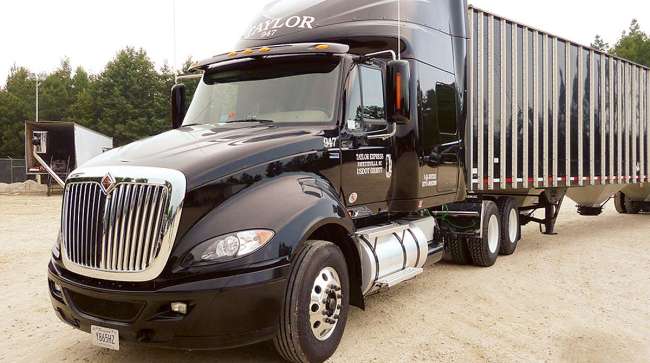Senior Reporter
Celadon Reaches Deal to Sell Taylor Express for $14.5 Million

[Stay on top of transportation news: Get TTNews in your inbox.]
An agreement has been reached to sell the last remaining operating trucking company that is part of the now-bankrupt Celadon Group of Indianapolis.
Hope Mills, N.C.-based Taylor Express had been on the auction block, but a Jan. 22 asset auction was canceled after parent trucking company Celadon agreed to a $14.5 million offer to sell Taylor Express to White Willow Holding of Newfields, N.H. The sale price of Taylor Express is substantially below the $43 million Celadon paid for the regional carrier in January 2015.
Taylor Express was the only Celadon division that remained operational after the company shut down the weekend of Dec. 7-8 and filed for bankruptcy Dec. 9. Celadon said it wanted to keep Taylor Express operating so it could raise cash to help pay down its multimillion-dollar debt. Taylor Express has a substantial book of business, including moving products for Lowe’s home improvement chain, which also is based in North Carolina.
White Willow Holding is backed by New York investment firm Luminus Management, which invested more than $160 million and acquired nearly 50% of Celadon last summer, including refinancing some of its debt in a last-ditch effort to save the company from bankruptcy.

More on Celadon
Dec. 16, 2020: Bankruptcy Judge OKs Plan to Keep Celadon’s Taylor Express Operating
Dec. 9, 2019: Celadon Files for Bankruptcy
Dec. 5: Two Former Celadon Executives Charged in Fraud Scheme
Aug. 15: Celadon Gets $165 Million Infusion From Luminus Management
April 29: Celadon Group Sells Intermodal Operations to Bison Transport
April 25: Celadon to Pay $42.2 Million After Admitting to Accounting Fraud
April 22: Celadon Sells Logistics Group, Hopes for Financial Reporting in Fall
Oct. 3, 2017: Celadon Acknowledges Active SEC Investigation
July 13, 2017: Celadon Chairman, CEO Paul Will Steps Down
July 3, 2017: Celadon to Record Impairment Charge in Review of Company’s Value
May 2, 2017: Celadon's Financial Statements Called Into Question
April 25, 2016: Celadon Founder Russell Passes Away
June 23, 2014: Celadon’s Russell Used Hard Work, Luck To Build Large Cross-Border TL Carrier
On Dec. 6, just three days before the bankruptcy filing, two members of Celadon’s former executive management team were indicted on federal charges of securities fraud, bank fraud and lying to auditors. Earlier in 2019, the company agreed to pay $44.2 million in restitution to settle federal charges and claims of filing false financial statements that concealed losses related to its aging truck fleet.
Federal officials charge the complicated financial scandal cost the truckload and logistics company’s shareholders more than $60 million.
Celadon ranks No. 38 on the Transport Topics Top 100 list of the largest for-hire carriers in North America.
According to the Federal Motor Carrier Safety Administration’s SAFER website, Taylor Express, which was founded in 1987, operates nearly 170 power units and had on its payroll 161 drivers. For the sale to go through, Celadon must file with the bankruptcy court a “proposed form of order,” which spells out the details of the transaction to White Willow, along with a copy of the final purchase agreement. The next hearing in the case is scheduled for Jan. 30 in Wilmington, Del.
Stuart Brown, a bankruptcy attorney with law firm DLA Piper representing Celadon, told TT, “We are hopeful that it will close as soon as possible after the order is entered and the judge approves the transaction.”
There is another development in the story.
According to recently unsealed court documents, a $6.2 million breach of contract lawsuit had been filed against Celadon on Dec. 2, one week before the company declared bankruptcy. According to the lawsuit, it is alleged that Celadon and three subsidiaries collected and spent millions in receivables belonging to TA Dispatch of Ensley, Ala. The suit charges Celadon used that money to stay afloat in its final weeks of operation.
On April 16, 2019, Celadon announced it had sold its managed transportation and freight brokerage business, Celadon Logistics, to TA Services for $60 million.
In part one of a two-part exploration of autonomous technology today, our latest RoadSigns podcast revisits conversations with CEOs Alex Rodrigues of Embark and Cetin Mericli of Locomation. Hear them explain what testing automated trucks and developing platooning technology has taught them about the road ahead — and get new perspective with host commentary. Listen to a snippet from Rodrigues above, and to hear the full episode, go to RoadSigns.TTNews.com.
At the time of the sale, Celadon’s leadership acknowledged the move was an effort to reduce its debt load — estimated to be in the hundreds of millions of dollars — after the financial scandal.
“The sale of [Celadon] Logistics marks another important milestone in executing our strategic plan to simplify our business and reduce debt,” CEO Paul Svindland said last April.
According to a press release announcing the sale, TA had access to Celadon’s logistics platform and would “continue to serve customers’ needs on a revenue-sharing basis.” Celadon also agreed to share its IT network with TA. In addition, as part of the sale, Celadon’s logistics and trucking divisions were designated as the billing agents to invoice the customers on TA’s behalf and to ensure a “smooth transition of purchased assets.”
The lawsuit alleges that Celadon owes TA an estimated $4.4 million in receivables it collected but then never passed on.
The attorney representing TA, Brian Rostocki of Reed Smith LLP in Wilmington, was unavailable for comment.

A close-up of one of the Warhol originals, which a friend commissioned for Stephen Russell. (John Sommers II for Transport Topics)
Celadon’s legal team has filed a motion to have this lawsuit moved from Delaware’s state court system and have it included in the federal bankruptcy case.
Meanwhile, trucks, equipment and real estate are not all that is being sold as Celadon liquidates its asset to pay down debt.
According to recently filed bankruptcy documents, Celadon is selling four Andy Warhol screen prints, which were part of the famed artist’s “Truck” series. The buyers are Melissa and Matthew Rubel. She is the daughter of Celadon’s founder, the late Stephen Russell. The sales price is $105,000. The prints were hung in the lobby at the company’s Indianapolis headquarters. In typical Warhol fashion, the prints depict tractor-trailer trucks in bold colors, including yellow, orange, green and blue.
The company also is selling its building and other assets as part of the liquidation.
Want more news? Listen to today's daily briefing:


